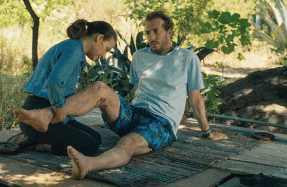Moving Toward and Away from Horror

It is sadly ironic that the Criterion Collection’s release of the new restoration of Ichikawa Kon’s Tokyo Olympiad (1964)—which is also included as part of the label’s massive box set 100 Years of Olympic Films, 1912–2012—followed closely on the heels of the postponement of the 2020 Tokyo Olympics due to the COVID-19 pandemic. Now optimistically rescheduled for 2021, the Games are scheduled to reuse some of the same sites as the ’64 edition (the Budokan for judo, the Tange Kenzo-designed Yoyogi National Gymnasium for handball, the Baji Koen Park for equestrian events), and the proceedings are once again to be filmed by a noted Japanese filmmaker, Kawase Naomi. Kawase had originally conceived of her Olympic film as a testament to Japan’s recovery from the 2011 Tohoku earthquake and tsunami, and the resulting meltdown at the Fukushima Daiichi Nuclear Power Plant—a threefold tragedy that she had previously addressed in her contribution to 3.11 A Sense of Home (2011), an omnibus project made in reaction to the disaster that also featured episodes from Jia Zhangke, Apichatpong Weerasethakul, Jonas Mekas, Patti Smith, Víctor Erice, and Bong Joon Ho, among others. In the new context of the pandemic, however, she stated in a recent interview with the Financial Times that she will now be approaching the theme of “recovery” with a focus on “all humans and the entire world”—a daunting but necessary response to an event that has shaken the world to its economic, physical, and psychological core.
As the Criterion set attests, Olympics films have often been haunted by spectres of horror and catastrophe even as they celebrate hope and triumph. Most notoriously, Leni Riefenstahl’s (1938) captures the fascist atrocities already occurring offscreen in the very act of glossing them over; conversely, Ichikawa’s —which begins with the torch being carried into the stadium by Sakai Yoshinori, the “Hiroshima baby” who was born the day the first atomic bomb was dropped on Japan—marks a remembrance of and an attempt to move beyond the devastation of the Pacific War. The omnibus film (1973) ends with a dedication to the murdered Israeli athletes at the 1972 Munich Games; (1989), Im Kwon-taek’s record of the 1988 Seoul Games, invokes memories of the Korean War and the preceding era of the country’s subjugation under Japanese colonial rule; while Carlos Saura’s (1993) uses the 1992 Barcelona Games as a means of celebrating Spain’s, is presented in the Criterion set in a new restoration).
You’re reading a preview, subscribe to read more.
Start your free 30 days





